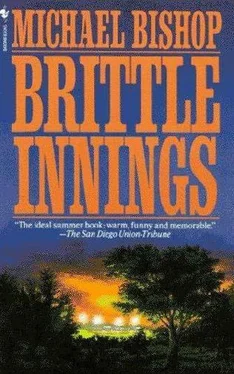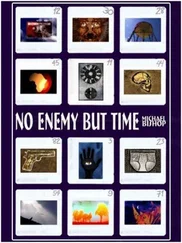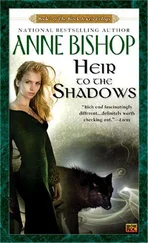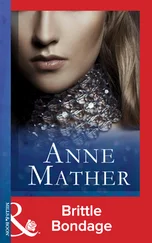Daddy played pickup baseball whenever he could, paid good money for bad illegal whiskey, and sparked all the “bad” young gals in and around Muskogee. He built barns, smoke-houses, and graineries for folk, and he learned auto mechanics from a local Pierce Arrow dealer. He loved cars. Well, no, their motors -their grease and pistons and belts.
A year before the stock market bottomed out, Daddy drove a trap from farm to farm selling Ful-O-Pep Mash, a chicken feed with cod-liver meal. It was supposed to prime a hen to lay eggs the size of baseballs. Mama said Daddy always held up a real baseball for skeptics, as if the mere sight would convince em. And the first time he drove his trap around hawking Ful-O-Pep, he did okay. Second visit, though, all a farmer had to do was hold one of his runty eggs next to Daddy’s baseball and the jig was up. The farmer’d say a sore-armed pitcher might appreciate the egg, but he felt cheated. Before long, Daddy quit drumming mash and locked into fixing farm machinery.
Mama had no job then. I was her job-a go-go mobile with a PA-system mouth.
Anyway, the market crashed, the Depression struck, and the Great Plains turned into dust sumps. Storms swept down even on our easternmost prairies and the hills around Tenkiller. Spooky roarers. The sun looked like a rusted garbage-can lid behind a big tea-stained curtain. Pure grit flowed through every chink in the shotgun hovel Daddy rented from Mr Neal on Tenkiller’s outskirts, coating every window ledge, shelf, and door lintel. It drifted into ridges under thresholds. Our gums bled. We mined our noses for booger pearls. Jobs dried up even faster than the land. Folks started to move.
On dust-free days, Dickie Boles played ball with me. He taught me how to catch and throw. I’d stand in front of the rear wall of Tenkiller’s abandoned icehouse hurling a rubber Spaldeen at it. (One of those hard pink hollow balls city kids used for stickball.) That sucker would bounce back faster than light. I’d field it bare-handed, quick-shift my feet, and snap it back at the bricks as hard as ever I could.
Daddy had me do that until I’d damned near drained off my last kilowatt of kid power. Time I was seven, I could play the bounce-backs for half an hour, bad hops and all, without booting a one or alley-ooping a single throw.
“If you can handle that,” Daddy’d say, “you can field em all.”
Daddy also taught me to hit. For that, he’d march me into the alley between the Cherokee Feed Store and Schlatt’s Small Appliances: Sparrow Alley. The chinks in the upper half of the feed-store wall sheltered hundreds of English sparrows, house sparrows, wrens. A sparrow apartment house. Those birds’d chirp and scold. If you didn’t take care, they’d get you with a whitewash bomblet or two.
In our alley games, the pitcher stood halfway along it. The hitter faced him from its streetside mouth, a broom or a mop handle for a bat. Daddy’d start, pitching the Spaldeen underhand. Before too long he’d go to a modified wind-up and a three-quarter delivery. I had to hit as many pitches on a clothesline to dead center as I could. No pulling or pushing the Spaldeen more than a foot or so to either side of my dad. If it hit a wall before getting past him, it was an out. A ricochet beyond him was a hit, though. So were uncaught blue darters up the middle. Rollers counted as fouls, but pop-ups were inning enders even if you’d just come in. A home run had to fly out the far end of Sparrow Alley in the air.
The Boles & Son Jes-for-Fun Oklahoma World See-ries. So Daddy called our games. If a dust squall didn’t blow up, we’d play until dark. Usually, Daddy beat me. If I won, I’d strut and preen. I’d brag to Mama. Today I know most of the games I took from Daddy were ones he let me have. Sometimes, though, he’d go on jake-leg binges and play me smashed. I’d beat him easy then, no charity to it.
Down a few runs, he’d lose the ball on purpose or break the broom handle over his knee and call me an upstart snot-nose. I got where I avoided him drunk, even though he was a pretty easy drunk, not a mean one, right up till I took a lead on him and he began to grasp how poorly he was doing, motor skills-wise. Strange to say, after Prohibition’d ended just about everywhere but Oklahoma, Daddy swore off drink for a while. Then, when I jumped him at alleyball, he’d laugh and call me “Tenkiller’s Ty Cobb.”
Dick Boles wasn’t Jesus Christ, but recalling him as he’d been when I was small, I couldn’t picture him like Sergeant Pumphrey did-as the sorriest man he’d ever had the bad luck to serve with. Until I was eleven or twelve, Dick Boles’d been a sockdalager daddy, good as a boy could want.
Lots of people, with the ruin of their farmlands, loaded up their pickups and set out for California ’s San Joaquin Valley: Okies. Will Rogers said they raised IQ levels in both states. Maybe so. The Boleses didn’t go. Daddy liked Oklahoma, and Mama still had kin about-in Muskogee and Tulsa, mostly. Jobs posed a problem, though, and in ’35 Daddy disappeared for eight months. Mama knew he wasn’t dead because he sent her twenty bucks a month through a cousin in Tahlequah. I attended school by then, and Mama clerked at Rexall.
Turned out, Daddy’d upped with the Civilian Conservation Corps. You had to be unmarried to join. Daddy fudged and got in anyway. He spent most of his time planting wind-breaks in Kansas, living in a camp between Coffeyville and Independence. The CCC gave him all his shots, fed him, and worked his tail off. Pay came to forty bucks a month, and, if the dust storms held off, all the fresh air and sunshine he could stand. Daddy snuck away in September, beelining it home. One of his bosses had acted like General Black Jack Pershing-plus, Daddy hadn’t been able to tinker with car engines as much as he liked.
In ’37 or ’38, Deck Glider opened its plant in Tenkiller. Probably Colonel Elshtain’s doing, using his connections. A few months later, Mama said good-bye to Rexall’s and went on the line at Deck Glider. Her take-home pay doubled. About this time, I guess, Daddy started breaking down into the no-account jerk Pumphrey remembered from Otter Point. He could’ve had him a job at Deck Glider too, but the very idea of hunching indoors over buffer-brush assemblies made him stir crazy. He figured Mama herself would finally crack and begged her to quit. She wouldn’t. He smuggled booze in from Fort Smith, or bought it off local leggers, and got stewed three or four times a week. He and Mama battled. Lots of times, they woke me up screeching like peacocks and shoving chairs around. Mornings, scratches on the floor would shine like yellow paint.
The summer World War Two started in Europe, Daddy cut out again. So what? I asked myself. So what? He hadn’t taken me to Sparrow Alley for months. I’d fire bounce-backs at the old icehouse, though, over and over-until my arms felt like window-sash weights. An outlet, you know. Therapy, a shrink today’d call it.
Mama and I expected Daddy back at any moment, the way he’d turned up, hungry puppy-like, after his unhappy stint with the CCC, but as the days wore on and the news from overseas got gloomier, we stopped expecting it. He didn’t wire us cash every month, the way he had before, and none of his cousins in the area would admit to having a clue about his whereabouts. Maybe they really didn’t, but Mama had her doubts.
In my Pullman berth, though, I dreamt about him.
My Red Stix team has to play a bunch of soldiers on a windy airfield in the Aleutians. Us Tenkillerites have on our regular flannel baseball togs, but the soldiers have dressed for the cold: boots, jackets with hoods, gloves like Army-drab oven mitts. An away game, see? The home team sets the playing conditions. I hop around at short, flapping my arms to keep warm. I hate playing soldiers because they’re older and more experienced. And, up in the Aleuts, they get last bat.
Читать дальше












